#It's giving poetry and myths
Explore tagged Tumblr posts
Text
Sometimes the tags don't leave enough space for my ramblings.
While working on this piece I was severely inspired by this post, by @mythalism, describing the path of Solas and Lavellan like submitting to the faith and expectations of 'godhood'.
There was another post as well, but I couldn't find it (if someone has a link, please share it!) about the theory that the Fade prison is the black city, which is the corrupted golden city from Andrastes tales. If you get one of the 'good endings', Solas or Solas and Lavellan are in a golden circle, instead of a black one. Does their love turn the corrupted city golden? Fjsjbwjdnrhdhsgdg

Here is a screenshot of @mythalism post, because everyone needs to read it again.


During the game we see the fade prison as a colorless bleak place. It'd like to imagine it's mirrored by the mental state of those occupying is. Trapped with anger and regret? You receive a disoriented and nightmarish space, which leaves you confused and lonely.
But if we are correct and it's actually the corrupted Golden City, it could be more akin to the Thedas variant of heaven once the corruption has been cleansed. Solas even talks about 'calming the blight' at the end of Veilguard. Calming the corruption within the black city?
So if the fade is a place of dreams, and reflects upon your own expectations. If Solas enters with the purpose of atonement, and Lavellan with the feeling of love and acceptance... The the fade might shift into something akin to this. A place that has color, peace and serenity. Where the light is always golden.
The total opposite of the prison we first glimpse when meeting Solas in Rooks' dream.
I'm losing my mind. It's giving Greek tragedy in mythalism's words and I'm living for it.

Solas x Lavellan
Dragon age the Veilguard
Tel banal, ara'ma
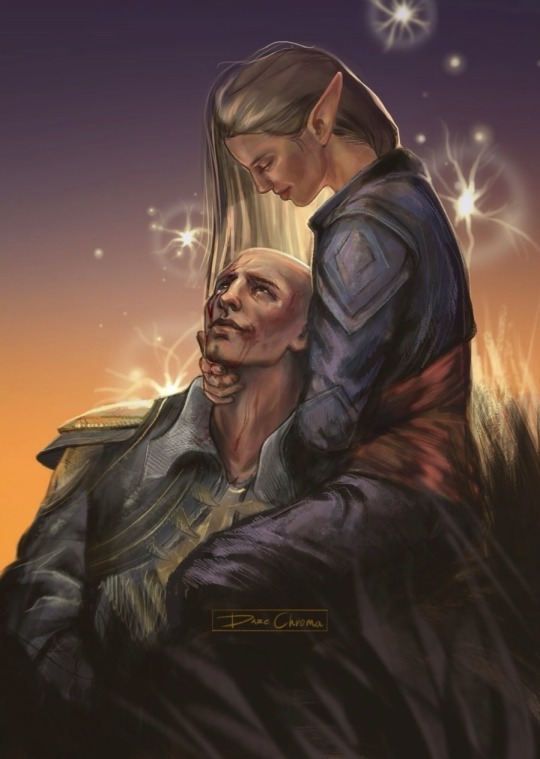
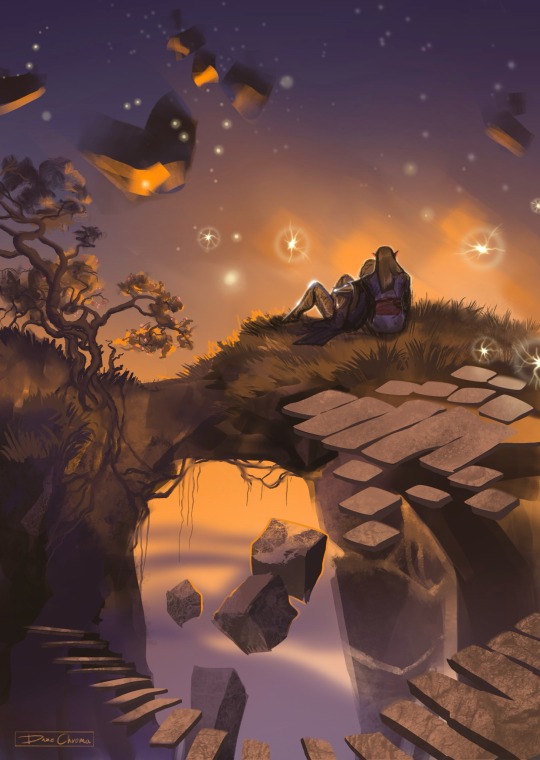
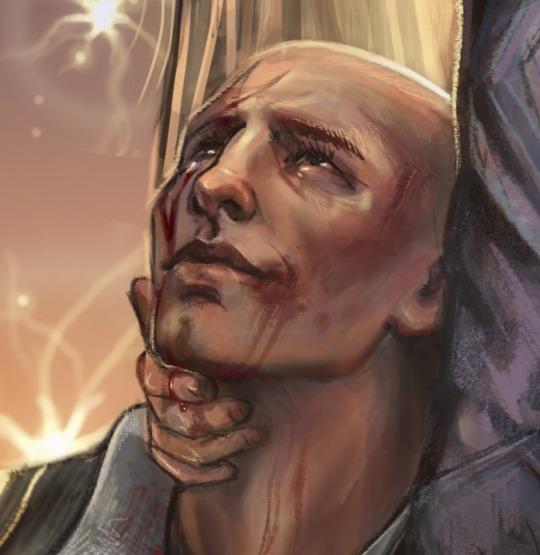
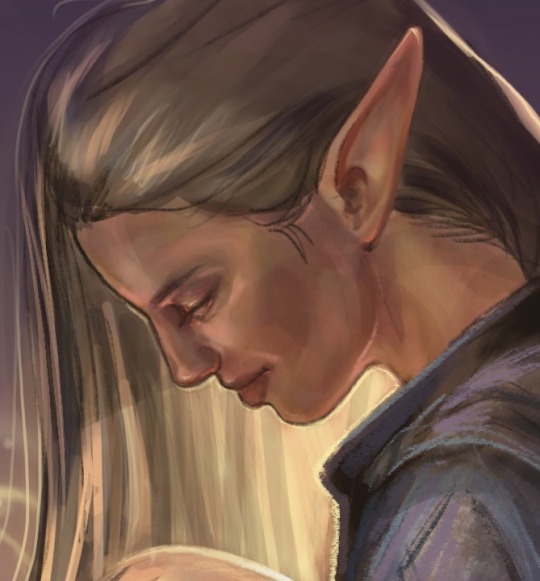
It won’t be terrible if you’re with me.
Available as print here.
#There are a lot of things to critique regarding the devs choices in Veilguard#But the solavellan ending is not one of them#We got served frilly cakes on a silver platter#We went from solavellan hell to solavellan heaven#It's giving poetry and myths#There will be songs written about their sacrifice#Datv is not perfect but I couldn't have wished for a better ending for solavellan#Dragon age meta#dragon age the veilguard#da:tv#dragon age#Mythalism#solavellan#Meta post#datv speculation#datv spoilers#Datv ending#Spoilers#solas x lavellan#solasmance#datv#my fanart
958 notes
·
View notes
Text
Uh... I haven't actually watched past season 3 of FiM lol. The latest gen's animation style doesn't really appeal to me at all.
May's a earth pony turned Alicorn w/ her specialty being related to combat and enchanted weaponry. She tends to make other ponies very uncomfortable with her particular form of magic, often preferring the company of dragons and griffons. She carries a lance said to pierce through any enchantments and a magic flask capable of granting any who drink from it exceptional artistic talent. ( She knows the rumors about her drink are complete poppycock but can't be bothered to correct them at this point. )
#odin was said to carry a magic mead that made you awesome at poetry in his butt#yeah that was a thing that happened in norse myth#This is the family friendly version#at most it's a energy drink that happens to give people a placebo effect#dash commentary.
1 note
·
View note
Text
The truth about Medusa and her rape... Mythology breakdown time!
With the recent release of the Percy Jackson television series, Tumblr is bursting with mythological posts, and the apparition of Medusa the Gorgon has been the object of numerous talks throughout this website… Including more and more spreading of misinformation, and more debates about what is the “true” version of Medusa’s backstory.
Already let us make that clear: the idea that Medusa was actually “blessed” or “gifted” by Athena her petrifying gaze/snake-hair curse is to my knowledge not at all part of the Antique world. I still do not know exactly where this comes from, but I am aware of no Greek or Roman texts that talked about this – so it seems definitively a modern invention. After all, the figure of Medusa and her entire myth has been taken part, reinterpreted and modified by numerous modern women, feminist activist, feminist movements or artists engaged in the topic of women’s life and social conditions – most notably Medusa becoming the “symbol of raped women’ wrath and fury”. It is an interesting reading and a fascinating update of the ancient texts, and it is a worthy take on its own time and context – but today we are not talking about the posterity, reinvention and continuity of Medusa as a myth and a symbol. I want to clarify some points about the ACTUAL myth or legend of Medusa – the original tale, as told by the Greeks and then by the Romans.
Most specifically the question: Was Medusa raped?
Step 1: Yes, but no.
The backstory of Medusa you will find very often today, ranging from mythology manuals (vulgarization manuals of course) to Youtube videos, goes as such: Medusa was a priestess of Athena who got raped by Poseidon while in Athena’s temple, and as a result of this, Athena punished Medusa by turning her into the monstrous Gorgon.
Some will go even further claiming Athena’s “curse” wasn’t a punishment but a “gift” or blessing – and again, I don’t know where this comes from and nobody seems to be able to give me any reliable source for that, so… Let’s put this out of there.
Now this backstory – famous and popular enough to get into Riodan’s book series for example – is partially true. There are some elements here very wrong – and by wrong I do mean wrong.
The story of Medusa being raped and turned into a monster due to being raped does indeed exist, and it is the most famous and widespread of all the Medusa stories, the one people remembered for the longest time and wrote and illustrated the most about. Hence why Medusa became in the 20th century this very important cultural symbol tied to rape and the abuse of women and victim-blaming. HOWEVER – the origin of this story is Ovid’s Metamorphoses, from the first century CE or so. Ovid? A Roman poet writing for Roman people. “Metamorphoses”? One of the two fundamental works of Roman literature and one of the two main texts of Roman mythology, alongside Virgil’s Aeneid. This is a purely Roman story belonging to the Roman culture – and not the Greek one. The story of Medusa’s rape does not have Greek precedents to my knowledge, Ovid introduced the element of rape – which is no surprise given Ovid turned half of the romances of Greek mythology into rapes. Note that, on top of all this, Ovid wasn’t even writing for religious purposes, nor was his text an actual mythological effort – he wrote it with pure literary intentions at heart. It is just a piece of poetry and literature taking inspiration from the legends of the Greek world, not some sort of sacred text.
Second big point: The legend I summarized above? It isn’t even the story Ovid wrote, since there are a lot of elements that do not come from Ovid’s retelling of the story (book fourth of the Metamorphoses). For example Ovid never said Medusa was a priestess of Athena – all he said was that she was raped in the temple of Athena. I shouldn’t even be writing Athena since again, this is a Roman text: we are speaking of Minerva here, and of Neptune, not of Athena or Poseidon. Similarly, Minerva’s curse did not involve the petrifying gaze – rather all Ovid wrote about was that Minerva turned Medusa’s hair into snakes, to “punish” her because her hair were very beautiful, and it was what made her have many suitors (none of which she wanted to marry apparently), and it is also implied it is what made Neptune fall in love (or rather fall in lust) with her. I guess it is from this detail that the reading of “Athena’s curse was a gift” comes from – even though this story also clearly does victim-blaming of rape here.
But what is very fascinating is that… we are not definitively sure Neptune raped Medusa in Ovid’s retelling. For sure, the terms used by Ovid in his fourth book of Metamorphoses are clear: this was an action of violating, sexually assaulting, of soiling and corrupting, we are talking about rape. But Ovid refers several other times to Medusa in his other books, sometimes adding details the fourth-book stories does not have (the sixth book for examples evokes how Neptune turned into a bird to seduce Medusa, which is completely absent from the fourth book’s retelling of Medusa’ curse). And in all those other mentions, the terms to designate the relationship between Medusa and Neptune are more ambiguous, evoking seduction and romance rather than physical or sexual assault. (It does not help that Ovid has an habit of constantly confusing consensual and non-consensual sex in his poems, meaning that a rape in one book can turn into a romance in another, or reversal)
But the latter fact makes more sense when you recall that the rape element was invented and added by Ovid. Before, yes Poseidon and Medusa loved each other, but it was a pure romance, or at least a consensual one-night. Heck, if we go back to the oldest records of the love between Poseidon and Medusa, back in Hesiod’s Theogony, we have descriptions of the two of them laying together in a beautiful, flowery meadow – a stereotypical scene of pastoral romances – with no mention of any brutality or violence of any sort. As a result, it makes sense the original “romantic” story would still “leak” or cast a shadow over Ovid’s reinvented and slightly-confused tale.
Step 2: So… no rape?
Well, if we go by Greek texts, no, apparently Medusa was not raped in Greek mythology, and only became a rape victim through Ovid.
The Ancient Greek texts all record Poseidon and Medusa sleeping with each other and having children, but no mention of rape. And the whole “curse of Athena” thing is not present in the oldest records – no temple of Athena soiling, no angry Athena cursing a poor girl… “No curse?” you say “But then how did Medusa got turned into a Gorgon”? Answer: she did not. She was born like that.
As I said before, the oldest record of Medusa’s romance but also of her family comes from Hesiod’s Theogony (Hesiod being one of the two “founding authors” of Greek mythology, alongside Homer – Homer did wrote several times about Medusa, but only as a disembodied head and as a monster already dead, so we don’t have any information about her life). And what do we learn? That Medusa is part of a set of three sisters known as the Gorgons – because oh yes, Ovid did not mention Medusa’s sister now did he? How did Medusa’s sisters ALSO got snake-hair or petrifying-gaze if only Medusa was cursed for sleeping with Neptune? Ovid does not give us any answer because again, it is an “adaptational plot hole”, and the people that try to adapt Ovid’s story have to deal with the slight problem of Stheno and Euryale needing to share their sister’s curse despite seemingly not being involved in the whole Neptune business. Anyway, back to the Greek text.
So, you have those three Gorgon sisters, and Medusa is said to be mortal while her sisters are not. Why is it such a big deal? Because Medusa wasn’t originally some random human or priestess. Oh no! Who were the Gorgons’ parents? Phorcys and Keto/Ceto, aka two sea-gods. Not just two sea-gods – two sea-gods of the ancient, primordial generation of sea-gods, the one that predated Poseidon, and that were cousins to the Titans, the sea-gods born of Gaia mating with Pontos.
So the Gorgons were “divine” of nature – and this is why Medusa being a mortal was considered to be a MASSIVE problem and handicap for her, an abnormal thing for the daughter of two deities. But let’s dig a bit further… Who were Phorcys and Ceto? Long story short: in Greek mythology, they were considered to be sea-equivalents of Typhon and Gaia. They were the parents of many monsters and many sea-horrors: Keto/Ceto herself had her name attributed and equated with any very large creature (like whales) or any terrifying monster (like dragons) from the sea. The Gorgons themselves was a trio of monsters, but their sisters, that directly act as their double in the myth of Perseus? The Graiai – the monstrous trio of old women sharing one eye and one tooth. Hesiod also drops the fact that Ladon (the dragon that guarded the golden apples of the Hesperids), and Echidna (the snake-woman that mated with Typhon and became known as the “mother of monsters”) were also children of Phorcys and Ceto, while other authors will add other monster-related characters such as Scylla (of Charybdis and Scylla fame), the sirens, or Thoosa (the mother of Polyphemus the cyclop). Medusa herself is technically a “mother of monsters” since she birthed both Pegasus the flying horse and Chrysaor, a giant. So here is something very important to get: Medusa, and the Gorgons, were part of a family of monsters. Couple that with the absence of any mention of curses in these ancient texts, and everything is clear.
Originally Medusa was not a woman cursed to become a monster: she was born a monster, part of a group of monster siblings, birthed by monster-creating deities, and she belonged to the world of the “primordial abominations from the sea”, and the pre-Olympian threats, the remnants of the primordial chaos. It is no surprise that the Gorgons were said to live at the edge of the very known world, in the last patch of land before the end of the universe – in the most inhuman, primitive and liminal area possible. They were full-on monsters!
Now you might ask why Poseidon would sleep with a horrible monster, especially when you recall that the Greeks loved to depict the Gorgons as truly bizarre and grotesque. It wasn’t just snake-hair and petrifying gaze: they had boar tusks, and metallic claws, and bloated eyes, and a long tongue that constantly hanged down their bearded chin, and very large heads – some very old depictions even show her with a female centaur body! In fact, the ancient texts imply that it wasn’t so much the Gorgon’s gaze or eyes that had the power to turn people into stone – but that rather the Gorgon was just so hideous and so terrifying to look at people froze in terror – and then literally turned into stone out of fear and disgust. We are talking Lovecraftian level of eldritch horror here. So why would Poseidon, an Olympian god, sleep with one of these horrors? Well… If you know your Poseidon it wouldn’t surprise you too much because Poseidon had a thing for monsters. As a sort of “dark double” of Zeus, whereas Zeus fell in love with beautiful princesses and noble queens and birthed great gods and brave heroes, Poseidon was more about getting freaky with all sorts of unusual and bizarre goddesses, and giving birth to bandits and monsters. A good chunk of the villains of Greek mythology were born out of Poseidon’s loins: Polyphemus, Antaios, Orion, Charybdis, the Aloads… And even his most benevolent offspring has freaky stuff about it – Proteus the shapeshifter or Triton half-man half-fish… So yes, Poseidon sleeping with an abominable Gorgon is not so much out of character.
Step 3: The missing link
Now that we established what Medusa started out as, and what she ended up as… We need to evoke the evolution from point Hesiod to point Ovid, because while people summarized the Medusa debate as “Sea-born monster VS raped and punished woman”, there is a third element needed to understand this whole situation…
Yes Ovid did invent the rape. But he did not invent the idea that Medusa had been cursed by Athena.
The “gorgoneion” – the visual and artistic motif of the Gorgon’s head – was, as I said, a grotesque and monstrous face used to invoke fright into the enemies or to repel any vile influence or wicked spirit by the principle of “What’s the best way to repel bad stuff? Badder stuff”. Your Gorgon was your gargoyle, with all the hideous traits I described before – represented in front (unlike all the other side-portraits of gods and heroes), with the face being very large and flat, a big tongue out of a tusked-mouth, snake-hair, bulging crazy eyes, sometimes a beard or scales… Pure monster. But then… from the fifth century BCE to the second century BCE we see a slow evolution of the “gorgoneion” in art. Slowly the grotesque elements disappear, and the Gorgon’s face becomes… a regular, human face. Even more: it even becomes a pretty woman’s face! But with snakes instead of hair. As such, the idea that Medusa was a gorgeous woman who just had snakes and cursed-eyes DOES come from Ancient Greece – and existed well before Ovid wrote his rape story.
But what was the reason behind this change?
Well, we have to look at the Roman era again. Ovid’s tale of Medusa being cursed for her rape at the hands of Neptune had to rival with another record collected by a Greek author Apollodorus, or Pseudo-Apollodorus, in his Bibliotheca. In this collection of Greek myths, Apollodorus writes that indeed, Medusa was cursed by Athena to have her beautiful hair that seduced everybody be turned into snakes… But it wasn’t because of any rape or forbidden romance, no. It was just because Medusa was a very vain woman who liked to brag about her beauty and hair – and had the foolish idea of saying her hair looked better than Athena’s. (If you recall tales such as Arachne’s or the Judgement of Paris, you will know that despite Athena being wise and clever, one of her main flaws is her vanity).
“Wait a minute,” you are going to tell me, “The Bibliotheca was created in the second century CE! Well after Greece became part of the Roman Empire, and after Ovid’s Metamorphoses became a huge success! It isn’t a true Greek myth, it is just Ovid’s tale being projected here…” And people did agree for a time… Until it was discovered, in the scholias placed around the texts of Apollonios of Rhodes, that an author of the fifth century BCE named Pherecyde HAD recorded in his time a version of Medusa’s legend where she had been cursed into becoming an ugly monster as punishment for her vanity. We apparently do not have the original text of Pherecyde, but the many scholias referring to this lost piece are very clear about this. This means that the story that Apollodorus recorded isn’t a “novelty”, but rather the latest record of an older tradition going back to the fifth century BCE… THE SAME CENTURY THAT THE GORGONEION STARTED LOSING THEIR GROTESQUE, and that the face of Medusa started becoming more human in art.
[EDIT: I also forgot to add that this evolution of Medusa is also proved by strange literary elements, such as Pindar's mention in a poem of his (around 490 BCE) of "fair-cheeked Medusa". A description which seems strange given how Medusa used to be depicted as the epitome of ugliness... But that makes sense if the "cursed beauty" version of the myth had been going around at the time!]
And thus it is all connected and explained. Ovid did invent the rape yes – but he did not invent the idea of Athena cursing Medusa. It pre-existed as the most “recent” and dominating legend in Ancient Greece, having overshadowed by Ovid’s time the oldest Hesiodic records of Medusa being born a monster. So what Ovid did wasn’t completely create a new story out of nowhere, but twist the Greek traditions of Athena cursing Medusa and Medusa having a relationship with Poseidon, so that the two legends would form one and same story. And this explains in retrospect why Ovid focuses so much on describing Medusa’s beautiful hair, and why Ovid’s Minerva would think turning her hair into snake would be a “punishment fit for the crime”: these are leftovers of the Greek tale where Medusa was punished for her boasting and her vanity.
CONCLUSION
Here is the simplified chronology of how Medusa’s evolution went.
A) Primitive Greek myths, Hesiodic tradition: Born a monster out of a family of sea-monsters and monstrous immortals. Is a grotesque, gargoylesque, eldritch abomination. Athena has only an indirect conflict with her, due to being Perseus’ “fairy godmother”. Has a lovely romance with Poseidon.
B) Slow evolution throughout Classical Greece and further: Medusa becomes a beautiful, human-looking girl that was cursed to have snake for hair and petrifying eyes, instead of being a Lovecraftian horror people could not gaze upon. Her conflict with Athena becomes direct, as it is Athena that cursed her due to being offended by her vain boasting. Her punishment is for her vanity and arrogant comparison to the goddess.
C) Ovid comes in: Medusa’s romance with Poseidon becomes a rape, and she is now punished for having been raped inside Athena’s temple.
[As a final note, I want to insist upon the fact that the story of Medusa being raped is not less "worthy" than any other version of the myth. Due to its enormous popularity, how it shaped the figure of Medusa throughout the centuries, and how it still survives today and echoes current-day problems, to try to deny the valid place of this story in the world of myths and legends would be foolish. HOWEVER it is important to place back things in their context, to recognize that it is not the ONLY tale of Medusa, that it was NOT part of Greek mythology, but rather of Roman legends - and let us all always remember this time Poseidon slept with a Lovecraftian horror because my guy is kinky.]
EDIT:
For illustration, I will place here visuals showing how the Ancient art evolved alongside Medusa's story.
Before the 5th century BCE: Medusa is a full-on monster



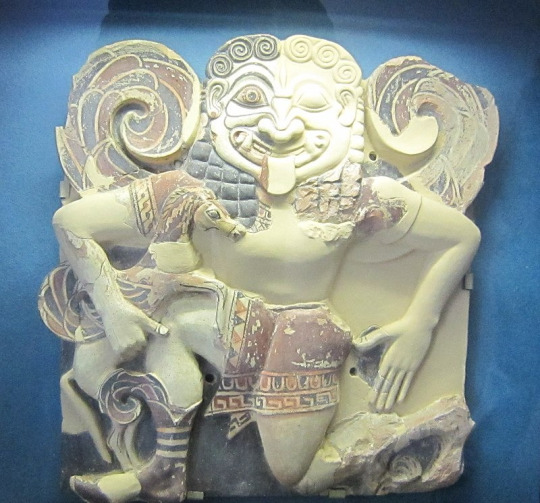

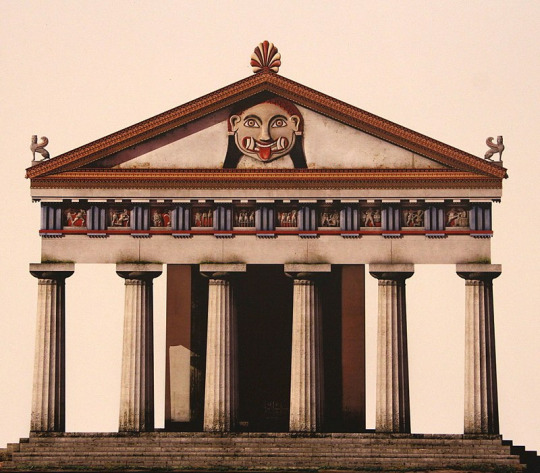
From the 5th century to the 2nd century BCE: A slow evolution as Medusa goes from a full-on monster to a human turned into a monster. As a result the two depictions of the grotesque and beautiful gorgoneion coexist.
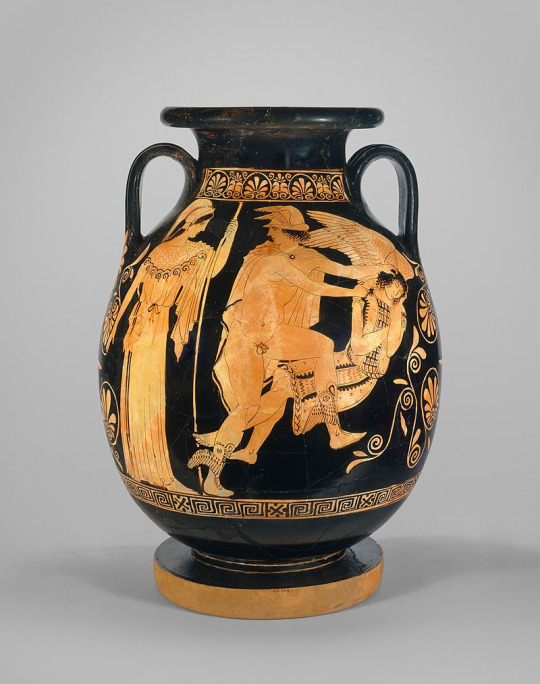


Post 2nd century BCE: Medusa is now a human with snake hair, and just that


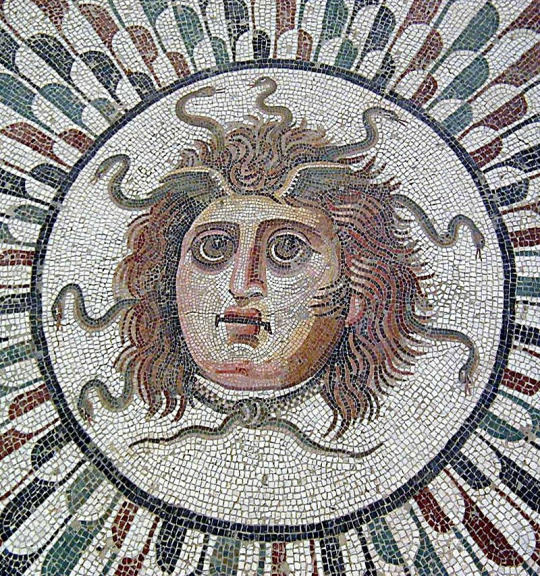
#greek mythology#medusa#gorgon#athena#gorgons#poseidon#neptune#minerva#ovid#rape in mythology#greek monsters#roman mythology
4K notes
·
View notes
Text
Bitches be like "Oh Hades always has to deal with his stupid youngest brother Zeus who cannot keep it in his pants."
First of all, Ancient Greeks didn't wear pants.
Secondly, Hades and Zeus are actually decent with each other. Hades isn't ashamed of asking him for help whenever he considers that there's the case, whereas Zeus trusts his eldest brother enough to give one of his daughters as his wife. There's also this whole discourse claiming that Zeus got the best and Hades got the worst, but if you actually give a second thought to it the Underworld actually has some of the greatest peaks: besides the fact that you're extremely rich all the mortals eventually become your subjects. Even poets stated that in numerous works:
Ovid, Fasti 4. 443 (trans.Boyle) (Roman poetry C1st B.C. to C1st A.D.) :
"[Zeus speaks :] ‘My rank is no greater [than Haides]. I hold court in the sky; another rules the sea [Poseidon], and one the void [Haides].’"
Or:
Seneca, Hercules Furens 53 (trans. Miller) (Roman tragedy C1st A.D.) :
"Dis [Haides] himself, who drew a lot equal to Jove's [Zeus's]."
But if you're so desperate to give Hades a brotherly rivalry then I'm here to tell you that there's no need to erase all of Zeus' qualities (leadership skills, wisdom, long-term planning, determination, cunning etc.) and over exaggerate all of his bad actions in order to portray him as an incompetent asshole Hades always has to deal with. You could simply give Hades and Poseidon this type of dynamic instead.
Poseidon is way more impulsive, temperamental and testy than Zeus. He doesn't hesitate to show his wrath, let aside make others suffer because of it. On top of that, he's the god of the sea and earthquakes, and he's also almost as powerful as Zeus. His attributes and realm could easily represent a threat to the Underworld if he lets his anger go too far.
Take this passage from the Iliad as a relevant example:
Homer, Iliad 20. 67 ff :
"Poseidon from deep under them shuddered all the illimitable earth, the sheer heads of the mountains. And all the feet of Ida with her many waters were shaken and all her crests, and the city of Troy, the ships of the Akhaians (Achaeans). Aïdoneus [Haides], lord of the dead below, was in terror and sprang from his throne and screamed aloud, for fear that above him he who circles the land, Poseidon, might break the earth open and the houses of the dead lie open to men and immortals, ghastly and mouldering, so the very gods shudder before them; such was the crash that sounded as the gods came driving together in wrath."
Dude was freaking out in this scene. During the entire Greek Mythology he's presented as stoic and rarely frightened, but when his brother was causing a strong earthquake he was shitting himself and sucking his thumb like a baby (metaphorically). For the first and last time we see a god being vulnerable and scared by other gods in a similar way a mortal who is about to lose all of his property and belongings would be. Poseidon is pretty much capable of drowning the entire Underworld or exposing it to the Aboveworld if he wants to, so who's actually the more problematic brother? The one who can maintain his calm and control and understands better how distructive power can be, or the one whose anger was on the edge of breaking the border between the realms of the living and the dead?
What if people would stop completely changing the original personalities of the Greek Gods and create more headcanons and fanfictions based on what's actually stated (or at least what is suggested/more plausible) in the myths?
416 notes
·
View notes
Text
Star’s beginners guide to Aphrodite worship 🐚💕
Who is Aphrodite?
Aphrodite is the goddess of love, sex, beauty, seduction, and war. She is most commonly known for her immense beauty and her many associations with sex.
What are some things she is associated with?
Doves
Flowers like roses
The colors pink, red, blue, green, white, and gold
Crystals like rose quartz, clear quartz, pearls, diamonds, sapphires, amethyst, rubies, moonstones, and aquamarines
Incense that smells of rose, cinnamon, myrrh, frankincense, vanilla, and jasmine
Her tarot cards, The Lovers, The Empress, and The Star
What can I give to her as offerings?
Shells or shell imagery
Ocean imagery
Swan and dove imagery
Heart imagery
Valentine's day gifts like chocolates
Imagery/paintings that depict her
Roses or rose imagery
Doing skincare for her
Perfumes or colognes
Hairbrushes
Mirrors
Doing your makeup
Moonwater
Strawberries, apples,and raspberries
Devotional acts or things you can do in her honor
Giving compliments to people
Collecting things you find pretty
Wearing jewelry you've offered or devoted to her
Watch or read romantic material
Self-love
Masturbation (if comfortable in doing so)
Sex (if comfortable in doing so)
Wear perfume dedicated to her
Spend time with loved ones
Create a digital altar (these can be done on Pinterest)
Write poetry about her
Write a letter to her
Create or listen to a playlist dedicated to her
Talk to her (tarot cards, dice, pendulum, and other forms of divination work just fine)
What is it like working with her?
When it comes to Aphrodite, in myth, she was often known as a wrathful and jealous goddess. However, since the myths are just stories and are known to exaggerate some details, this isn’t usually the case.
However, when people mention to others that they are interested in working with Aphrodite, they usually say that you absolutely should not. That she is needy, requires a lot of attention and offerings, that if you don’t do what she says, she will take your beauty away.
This is also not the case.
In my experience as an Aphrodite worshipper, she is very loving, along with being insanely passionate. Also being very vocal about her needs and wants.
Often getting signs from her isn’t at all uncommon. I remember the first few weeks I started working with her, I got an image on my feed that had these two eels intertwined together in a heart shape.
You will often feel connected to sea life, the sea in general, wanting to do things for yourself like dressing nicer and wanting to take care of yourself more.
Here are some things I’ve experienced in my time in working with her.
When I first started praying to her, I stuttered and fumbled over my words. A lot. I was oddly nervous about it? I’m not the type to stutter and fumble often. But beginning to feel nervous and even embarrassed in the presence of the goddess of love? Very normal.
She often enjoys getting milk and dark chocolate, along with roses or any kind of flower, real or not. I gave her chocolates, a fake rose, and a real flower for valentines day and she was insanely happy with it. So much so that her candle rested in a heart shape for a short while.
I often saw butterflies, a symbol of Aphrodite.
I often feel inclined to go to the beach, collect seashells, and do things that make me feel good.
I feel more comfortable expressing love. Before, I was never the type to use pet names for people, especially for friends. But i’ve noticed that I now call people sweet and endearing names. Honeybun, sweet pea, boo, sweetie/sweetness, and babes are things i’ve been saying lately.
She is very honest, often not sugarcoating things. I asked her when my ex first asked me out if we’d last. She said no and gave me explicit reasons as to why. Though I still went out and dated them anyway, and it pretty much ended in the way she said.
She very much enjoys art work of her. I’ve drawn her a few times, asking her to guide my hand in doing so.
Whenever I feel unattractive or hate something about my appearance, she usually makes someone compliment me that day or that week. I was having an off day with my hair, and in that same hour, a girl walked up to me and said that she loved my hair and the style it was in.
That is it for my beginners Aphrodite worship guide! I will be doing these for the other two deities I work with, Apollo and Freyja.
I do hope these were helpful. If you have any questions or need assistance with anything, my ask box and my dms are always open. So be sure to shoot me a message!
Much love to you. <3
#deity#deity worship#deity work#aphrodite#lady aphrodite#aphrodite deity#diety worship#aphrodite worship#goddess worship#hellenic altar#hellenic deities#hellenic worship#hellenic polytheism#aphrodite devotion#aphrodite art#greek paganism#paganblr
370 notes
·
View notes
Text

Airport Au!Jason gets coffee spilled on him right before he boards his flight back to Gotham and of course, he's the victim of hot coffee spilling all over his crotch. The good news is, Jason didn't suffer any burns and you were quite apologetic to him, nevertheless, he was still pissed at you and those clumsy hands of yours. To make matters worse, the two of you are seated next to each other on a 15-hour flight.
Airport Au!Jason lets you have the inside seat even though you ruined his favorite Wonder Woman t-shirt and kinda fucked up his black jeans. He even puts your suitcase away for you and he has no fucking clue why. Jason knew he didn't help strangers like this, not just be nice and flirty to girls like Dick did. But didn't do things like this for no reason especially not for pretty girls who- wait did he just call you pretty? Oh, he was so fucked.
Airport Au!Jason can't tell if he's mad at you or if he wants you. To him those feelings could be the same, he has no problem with wanting to make out with the girl who spilled coffee on his shirt. He didn't see a problem with wanting to make you his, it was an accident and you apologized a million times so maybe he should just forgive you, especially since you actually tried to clean his crotch. His self-control stopped him from letting you, but now he wishes he had let you.
Airport Au!Jason gets immediately bored after the plane takes off, he hadn't pack much because he likes to travel light. When his gaze falls in your direction, he notices that you are reading and annotating one of his favorite Sylvia Plath books and quickly starts to chat you up. You immediately light up when you find out he loves reading, especially classics and poetry. The two of you quickly got acquainted and introduced yourselves which was quickly followed by an apology. You didn't think boys who were smart and hot truly existed, you thought those were myths but Jason Todd was indeed very real.
Airport Au!Jason lets you nap on his shoulder and even orders your lunch for you so that you'd at least get some food when you woke up. You wake up to the boy thumbing through your annotations. You point out your favorite scenes and quotes and go into detail about what you thought their meanings were, well at least to you. You rambled for what might've been a good hour and fuck, Jason knew just by hearing you talk like this, he wanted to put his lips on yours so bad. Maybe shut you up for a second, not because you rambled but because your lips looked so delicious like he could devour them if he wanted. Maybe it could last more than a second, but that depended on what you'd let him do to you.
Airport Au!Jason can't help but want your attention sooo bad. He's chatting you up, making you laugh and for fucks sake why was your laugh so cute?? Why were so pretty to him? Why did you make him question every part of his being? It was like you were this missing piece he had finally found and he needed that piece. He needed you.
Airport Au!Jason jokingly warns you he's not good for you but that only makes you tilt your head with a big grin. You told him that you didn't want a "good" guy. You wanted someone morally grey, someone who understands that just because you've done bad things doesn't mean you're a bad person. You of course cleared up that you didn't support racists, homophobes, and such but you weren't past dating a criminal or even a vigilante if they matched your vibe. For a moment, Jason felt like you already accepted who he was, that you would still want to know him as the Red Hood. He hoped that maybe that was the truth.
Airport Au!Jason sneaks you into first class, pulling the "Bruce Wayne is my dad" card with the flight attendants, who swoon when Jason brings out the stolen Amex card. He'd give it back to Bruce another day or maybe just sneak it back into his wallet. The reason he gets you in so you can sleep comfortably because he knew there would be free seats (he's done this a bit too many times). You told him you didn't need to, that you liked napping on his shoulder, that he was enough but he said you deserved the luxury treat, not crappy shoulder. And it made you laugh because it was so cheesy, and Jason wished then and there, that he could hear you laugh like that for the rest of his life. Now, did he hate having to pull the "Bruce Wayne" card? Yes. Did he regret it? Hell no. Would he do it again? Yes…
Airport Au!Jason lets you play with his hair and even touch his neck scar while you lay in first class. You graze your finger across it and you feel him tense until he relaxes when your fingers lace with his. He lets you believe the white parts are dyed and tells you the scar was from a kidnapping incident that happened in his teens. You don't question him on it but instead, ask him if he still wants to know once the two of you land in Gotham. He looks at you with a cheesy grin. He says he doesn't have his phone on him but you could write your number on his arm. You knew he was joking but he was just so attractive. He enjoys the feeling of one of your hands combing his locks and the other intertwined with his.
Airport Au!Jason falls asleep with you in first class and when you two finally wake up, you decide to check how much time is left on the flight: 2 hours. A soft whine left your lips, from the thought of having to wait a a little longer to be able to kiss him. You could just tell Jason wasn't a fan of pda and if you did kiss him you'd definitely want it to be private. You told yourself to be patient and you knew you could be just a little longer, just for him. Jason on the other hand was an impatient asshole who ached for you, especially after hearing that goddamn whine. Were you trying to tease him? Because if you were it was definitely working. Jason couldn't wait 2 hours.
Airport Au!Jason brings you into the first bathroom and locks it behind him, even after receiving about of weird looks. He kisses you in with your legs almost instantly hooked around his waist and his arms holding you up against the wall. Your arms are wrapped around his neck bringing him as close as possible, while you clawed at his clothes. You weren't exactly sure where this was going but you wanted that coffee-stained shirt off him. You hooked your fingers on the ends of his shirt whining desperately to feel him. Maybe those clumsy hands of yours were good at something. And when he finally breaks the kiss, he only mutters out these words just for you, "Wanna help me get out the shirt you ruined, sweetheart?"

#✩ kleo's kollection ✩#divider by cafekitsune#jason todd#jason todd x reader#jason todd x you#jason todd imagine#jason todd is red hood#jason todd x y/n#jason todd fluff#suggestive#red hood#red hood x reader#red hood x you#red hood imagine#x reader#dc x reader#dc x fem#dc x y/n#dc x you#dc#dc comics#reader insert#dick grayson cameo#red hood x y/n#red hood x gender neutral reader#jason todd x gender neutral reader
1K notes
·
View notes
Text
Animal AU (click for clarity)
CW: blood and creepy stuff in the description
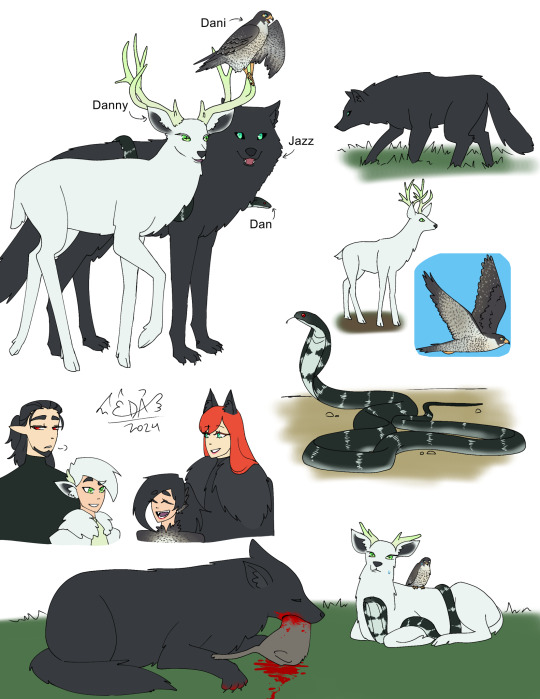
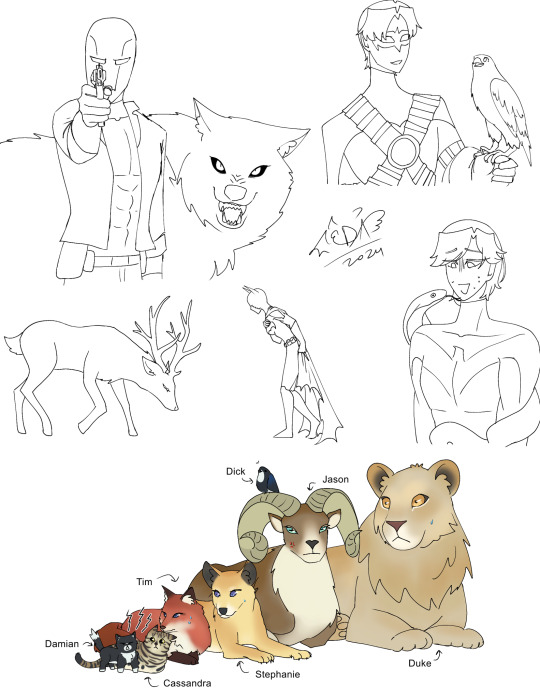
If I have to color Dani one more time, I’m going to riot 😭
Notes below: (very long and detailed)
+ Jazz is a melanistic gray wolf, Danny is an albino mule deer, Dan is a king cobra, Dani is a peregrine falcon. Some of these ideas are taken from my dp royal court ideas.
I associate Jazz with wolves and canines. She is very loyal and protective, which I think would be best associated with canines. I usually give her the largest animals possible (because of her height), and gray wolves are the largest of all wolves. She is melanistic due to the fact that I like her color palette of black and turquoise. It also gives her a special connection to Danny that I do on purpose where they are black and white.
Dan is associated with cold blooded animals in my mind, cold in demeanor, vicious, and slippery. He is a king cobra because king cobras are the largest of all venomous snakes. They are also not true cobras, which adds a nice connection to Dan as being the most different out of all of the halfas. Surprisingly, king cobras are rather friendly to humans, which might be because of how smart they are.
I associate Dani with fast and speedy animals, so I often give her the fastest animals I can find lmao. Peregrine falcons are the fastest birds in the world, due to their diving speeds. I like how Dani is considered a bird because she is very free-spirited and flighty in my mind. I love it because I think she’d be really independent and would love the sky. Peregrine falcons also mostly eat birds, just like how king cobras eat other snakes, so that’s pretty cool too.
Danny is both kingly and creepy, which describes deer very well. Mule deer are very common in the US, and you might recognize them due to the fact that the Great Prince of the Forest (in Bambi) is inspired by a mule deer. Deer are fascinating creatures because there have been many, many folklores and myths about them, but none can compare to the real facts. Deer are very heavily affected by diseases such as chronic wasting disease, which can cause very strange behaviors. They get up after death, they walk off after being shot at or run over, they kill themselves repeatedly, they eat other animals, and they walk on their hind legs. All in all, while deer are very majestic and beautiful, they are also very, very freaky. There is a sense of poetry in how they’re hunted, which also applies to Danny. I think deer describes him very well :)
+ Meanwhile, the Batkids are a wild assortment of animals. Dick is a white throated needletail, Jason is an argali sheep, Cass is a black footed cat, Tim is a red fox, Stephanie is a dingo, Duke is an African lion, and Damian is a domestic cat (specifically a tuxedo cat).
Dick was always meant to be a bird. However, I wanted him to be fast, but not a bird of prey (which are usually the top 5 fastest birds). So I chose a white throated needletail for him, who are believed to be the fastest (while flying straight). They’re very elusive and photos are rare :( they are, however, very round and cute, and they even have a patch of shiny blue feathers on their wings, as well as v-shaped white spots, similar to his Nightwing suit!
Jason is an argali sheep because I associate him with lambs and rams. Mostly because sheep and lambs are associated with God and religious sacrifices (*cough cough* Jason dying), as well as innocence, docility, and obedience. Jason, as Red Hood, defies the meaning and memories of his past life as Robin, so I like the idea of him being a “black sheep” and defying those expectations of him as well. Argali sheep are known to have beautiful horns, are a species of wild sheep that live in mountains, and are also the largest of wild sheep.
Cass is a black footed cat because I feel like she’s very feline in demeanor, and black footed cats are one of the best hunters in the animal kingdom, with an over 60% chance of having a successful kill. (I think African wild dogs are the highest with 75-85%. It’s hard in the animal kingdom.) I also think it’s very cute of her to be so small but so deadly.
Tim is a red fox because of his cleverness and smarts. Red foxes are common in America and are usually hunted because people thought that foxes killed their livestock and dug up corpses. Tim is either really loved or really hated, so I feel like a red fox both symbolizes his irl status and his intelligence in the comics.
Stephanie is a dingo for no particular reason. However, they are social creatures and loved due to the fact that they have a history with humans. They’re golden colored and Stephanie gave off the vibes of an Australian, I literally cannot explain myself.
Duke is a lion for the same reasons: none in particular. However, lions are noble and considered very powerful. In my drawing of him, he is still a young adult, so his mane isn’t fully grown yet :3 he is 100% a normal lion tho!
Damian is a domestic cat for a few reasons. He is meant to be cute while the others are considerably scarier. There would also be a sense of irony bc I imagine that Talia is a big cat like a tiger or panther. However, cats are known as good hunters for a reason, and they have good instincts and can be just as loyal as dogs. As such, I think that he would be a regular kitty :3 other choices included him being a leopard cub, but it would be more funny if he was so small while everyone else is so big.
+ Something something, the two people who have had their deaths impact them the most and are often considered their parents’ greatest failures are prey animals that are usually hunted for sport….
+ Other small relationships between animal forms: the assassins are small cat forms. Dan being an animal not from the Americas, which also symbolizes him being out of place in the timeline. The Phantom family are purposefully made very different but also connected, examples being: a predator, a prey, a flying animal, and a cold blooded animal, etc. The Batfam being more random/less connected than the Phantom family due to their different backgrounds/lack of blood relation.
+ Their animal forms are also hint at the couples that I like, which is most obvious with Jason and Jazz lmaoooo. However, it is also a little noticeable in Tim and Dani (bird and fox), and definitely a little more obvious in Dan and Dick (snake and bird; please refer to my first piece of work with them tee hee). Danny’s is vague because I’m a multi-shipper with him, so he’s prey while most of everyone else are predator animals 💀
+ There are a few ideas in this (not counting the Pet AU): 1) Danny, Jazz, Dan, and Dani become companions and helpers to the Batfam, able to transform when necessary but also like spending time in their animal forms. In exchange, the Batfam help them with whatever problems they have and also give them sanctuary, 2) A regular animal-characteristics AU where everyone (or most of everyone, if humans exist) are some sort of animal hybrid creatures in the regular modern world, 3) The same as idea 2 but more Warrior Cats-esque where they’re way more animalistic, form packs, and live in less urban settings.
+ Yes, in his more humanoid form, Dan would have his legs replaced with a snake’s tail. I can’t decide between Dick and Dani having wings attached to their backs, or them having wings that connect to their arms.
+ Extras: Sam is a thoroughbred horse, Tucker is an American alligator, Valerie is a wolverine, and Wes is a swan. Bruce is a giant golden crowned flying fox, Alfred is an emperor penguin, and Barbara is a pony (but tbh, I’m open to suggestions).
#dc x dp#dp x dc#dpxdc#dcxdp#danny phantom x dc#dp x dc crossover#jazz fenton#danny fenton#danielle fenton#dani fenton#dark danny#dani phantom#danielle phantom#dan fenton#dan phantom#phantom family#animal au#dick grayson#duke thomas#damian wayne#cassandra wayne#cassandra cain#tim drake#jason todd#stephanie brown#tw blo0d#cw blood
229 notes
·
View notes
Text
William Blake - an introduction for Good Omens fans
I have sent @neil-gaiman an ask regarding his feelings toward the poet/artist William Blake a couple of times, but no doubt due to the size of the poor man's inbox I haven't received a response. So I did a Google search to see if he's spoken about Blake before, and it did indeed come up with a fair few hits. I think you might enjoy seeing this Twitter post if you haven't already, the painting is from William Blake's illustrations to Paradise Lost.
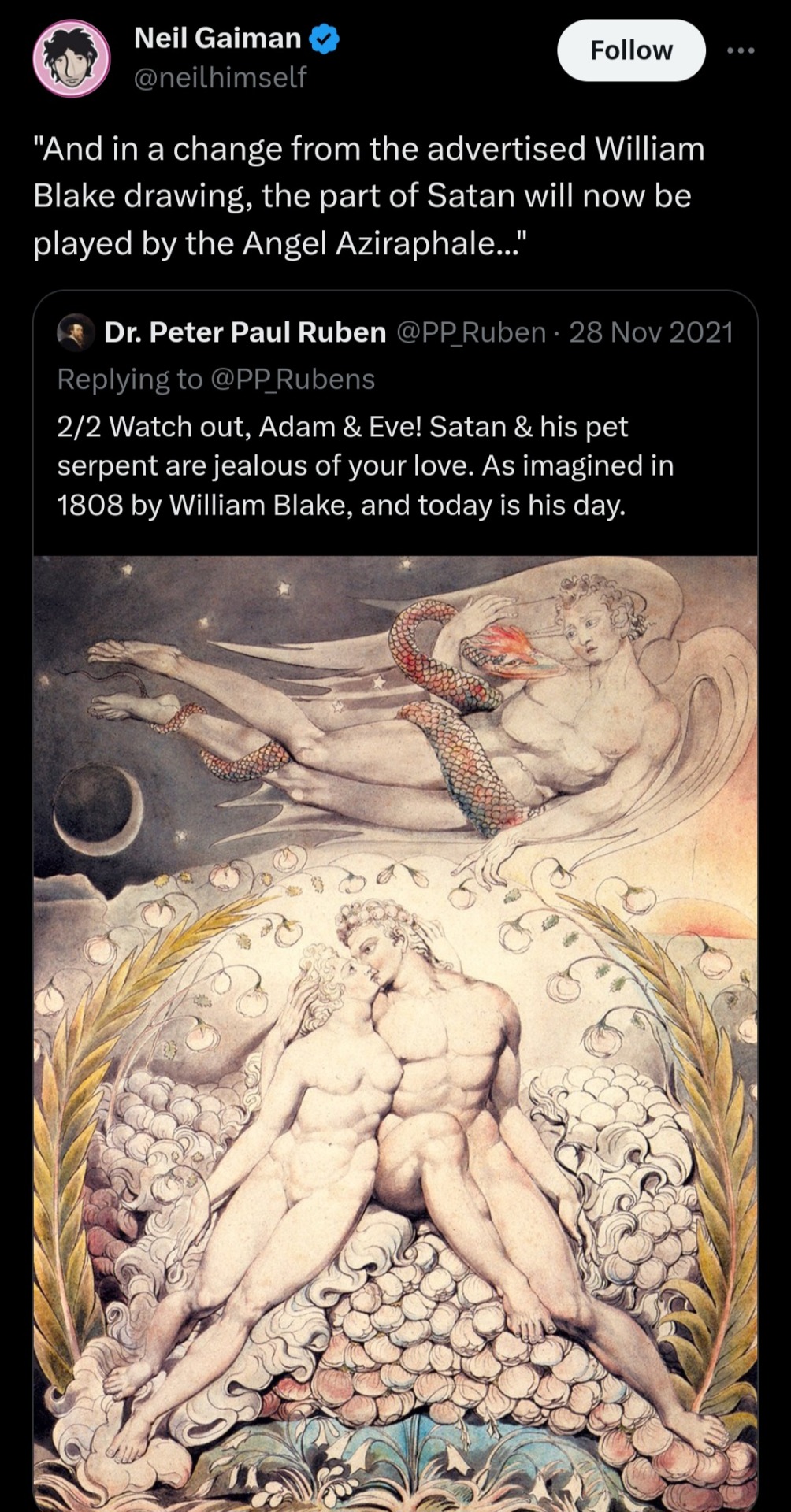
It's not surprising that an author like Neil Gaiman might have an interest in Blake. A visionary from a young age, his imagination was such that he was surrounded by angels made visible in his mind's eye, and he interpreted these visions through poetry, painting and engraving, and self-printed and published many of his own works. This gave him complete freedom to say exactly what he wanted.
Though he had a passionate faith in God, he also had a deep distrust of the church as an institution, and disliked the use of religion as a means of control. This poem from "Songs of Experience" perhaps summarises his feelings best:
"I went to the Garden of Love,
And saw what I never had seen:
A Chapel was built in the midst,
Where I used to play on the green.
And the gates of this Chapel were shut,
And 'Thou shalt not' writ over the door;
So I turn'd to the Garden of Love,
That so many sweet flowers bore.
And I saw it was filled with graves,
And tomb-stones where flowers should be:
And Priests in black gowns, were walking their rounds,
And binding with briars, my joys & desires."
In his poetry there is often an incongruity with the generally accepted religious ideas of what is good and evil, Angel and Demon. In The Marriage of Heaven and Hell (there's a title that should make any GO fan sit up and pay attention) he tells us that "in the book of Job, Milton's Messiah is called Satan", signifying that he feels it is Lucifer/the devil who is the true Messiah of Paradise Lost.
He gives us The Voice of the Devil and Proverbs of Hell, and has Angels being transformed into Demons through enlightenment. He tells us that Jesus broke all of the 10 commandments, yet was still virtuous because he acted according to his own morality rather than rules.
The god-figure of his later works, Urizen, generally comes across as malevolent, seeking to bind and control, whilst Los, the Satan/Messiah figure represents freedom, imagination and creativity.
"Restraining desire" and acting contrary to your own nature seem to be the only real evils for Blake.
He expressed his faith through a love of the world and the beauty in it, summed up in this quote:
"When the Sun rises do you not see a round Disk of fire somewhat like a Guinea? O no no I see an innumerable company of the Heavenly host crying Holy Holy Holy is the Lord God Almighty".
He saw "God" in everything, in all the wonders we have around us, and considered writers/poets and religious prophets as essentially the same, since they both have a connection to the divine, and express it through stories.
It's quite ironic that probably his most famous poem, Jerusalem (the one that starts "and did those feet in ancient times walk upon England's mountains green"), was made into a very popular church hymn, yet it is supposed to be satirical in nature. The poem recounts the myth that Jesus may have visited England in his boyhood, and Blake is expressing his disbelief at that notion and the unworthiness of England.
Did I have a point to all this? Mostly to show my hand as a massive Blake nerd, but also to hopefully demonstrate that there's a lot of common ground between his ideas and those expressed in a show/book like Good Omens, and hopefully to inspire some of you who may not be familiar with Blake to seek him out. In particular I'd recommend The Marriage of Heaven and Hell to any and all.
EDIT: I should have thought to include this, here's Michael Sheen reading a Blake poem. I have the CD this is from, he reads several by Blake, as well as other poets I love ❤️ 😍
youtube
#william blake#good omens#good omens book#good omens 2#good omens s3#neil gaiman#crowley#aziraphale#english literature#literature#poetry#go2#good omens s2#good omens season 2#book omens#michael sheen#Youtube
1K notes
·
View notes
Text
Just spent a couple hours digging into this book. I'm not even sure what has worse environmental impacts, the paper the book is made of or the opinions printed within.
Is "post-colonial" literary theory a joke? It's distressing that a book printed in 2021 by a reputable academic press can be so painfully Eurocentric, and I mean PAINFULLY. The philosophical and literary frameworks drawn upon in most chapters are like what some British guy in 1802 would come up with. In most of the chapters, every framework, terminology, and example is inseparably fused to Latin, Greek, and/or Christian philosophers, myths and texts, even down to the specific turns of phrase. You would think only Europeans had history or ideas until the 20th century.
Don't get me wrong, non-european and even specifically anti-colonial sources are used, and I don't think all the writers are white people, but...that's what's so weird and off-putting about it, most of the book as a whole utterly fails to absorb anything from non-European and in particular anti-colonial points of view. The chapters will quote those points of view but not incorporate them or really give their ideas the time of day, just go right back to acting like Plato and Aristotle and Romantic poets are the gold standard for defining what it means to be human.
In brief, the book is trying to examine how literature can shed light on the climate crisis, which is funny because it completely fails to demonstrate that literature is good or helpful for the climate crisis. Like that is for sure one major issue with it, it shows that people *have* written stuff about climate change, but it sure doesn't convince you that this stuff is good.
Most of the works quoted are rather doomerist, and a lot of the narrative works specifically are apocalypse tales where most of Earth's population dies. The most coherent function the authors can propose that literature fulfills is to essentially help people understand how bad things are. One of the essays even argues that poetry and other creative work that simply appreciates nature is basically outdated, because:
“One could no longer imagine wandering lonely as a cloud, because clouds now jostle in our imaginations with an awareness of atmospheric concentrations of carbon dioxide and other atmospheric pollutants” (Mandy Bloomfield, pg. 72)
Skill issue, Mandy.
The menace of doomerism in fiction and poetry is addressed, by Byron Caminero-Santangelo, on page 127 when he references,
the literary non-fiction of a growing number of authors who explicitly assert, some might even say embrace, the equation between fatalistic apocalyptic narrative and enlightenment…they are authoritative in their rejection of any hope and in their representation of mitigatory action as the cliched moving of deckchairs on a sinking ship
He quotes an essay “Elegy for a country’s seasons” by Zadie Smith, who says: “The fatalists have the luxury of focusing on an eschatological apocalyptic narrative and on the nostalgia of elegy, as well as of escape from uncertainty and responsibility to act." Which is spot-on and accurate, but these observations aren't recognized as a menace to positive action, nor is the parallel to Christian thought that eagerly looks forward to Earth's destruction as a cathartic release from its pain made fully explicit and analyzed. Most of the creative works referenced and quoted in the book ARE this exact type of fatalistic, elegiac performance of mourning.
I basically quit reading after Chapter 11, "Animals," by Eileen Crist, which begins:
The humanization of the world began unfolding when agricultural humans separated themselves from wild nature, and started to tame landscapes, subjugate and domesticate animals and plants, treat wild animals as enemies of flocks and fields, engineer freshwater ecologies, and open their psyches to the meme of the ‘the human’ as world conquerer, ruler and owner.
This is what I'm talking about when I say it's dripping Eurocentrism; these ideas are NOT universal, and it's adding nothing to the world to write them because they fall perfectly in line with what the European colonizing culture already believes, complete with the lingering ghost of a reference to the Fall of Man and banishment from the Garden of Eden. It keeps going:
“Over time, the new human elaborated a view of the animal that ruptured from the totemic, shamanic and relational past.”
Okay so now she's introducing the idea of progression from shamanic nature-worshipping religions of our primitive past...hmm I'm sure this isn't going anywhere bad
“While humanity has largely rejected the colonizing project with respect to fellow humans, the occupation of non-human nature constitutes civilization’s last bastion of ‘normal’ colonialism. A new humanity is bound sooner or later to recognize and overthrow a colonialism of ‘nature,’ embracing a universal norm of interspecies justice.” (pg. 206)
OKAY????
Not only denying that colonialism still exists, but also saying that humans' relationship with nature constitutes colonialism??
Embracing limitations means scaling down the human presence on demographic and economic fronts…(pg.207)
ope, there's the "we have to reduce the human population"
Embracing limitations further mandates pulling back from vast expanses of the natural world, thus letting the lavishness of wild (free) nature rule Earth again” (pg. 207)
aaaaaaand there's the "we have to remove humans from wild nature so it can be freeeeeee"
don't get me wrong like I am a random white person with no particular expertise in anti-colonialist thought but I think this is an easy one. I'm pretty sure if your view of nature is that colonialism involving subjugating humans doesn't exist any more and actually humans existing in and altering nature is the real colonialism so we should remove humans from vast tracts of earth, your opinion is just bad.
Anyways y'all know I have an axe to grind against doomerism so it was probably obvious where this was going but good grief.
973 notes
·
View notes
Text


── # to you who shines the brightest (i'll give you everything). masterlist. a kieran × mc!reader series.
summary: the fact that remained was this: some things were simply never meant to be. the universe's design was absolute; it was dangerous to go against it. but what if in this universe, things were different? what if in this universe, there's a glimmer of a chance? what if in this universe... fate no longer mattered? “to me, you’re already a sin i can’t refuse; sweeter than evil.” so to you who shines the brightest, i'll give you everything. [inspired by "volcano" by han jisung] general tags: canon-divergent, canon-typical violence, 2nd pov (primarily), female reader, slow burn, forbidden love, friends-with-benefits, friends-with-benefits to lovers, light/darkness dynamic, pining, yearning, unrequired-requited love, mentions of sacrifice, angst, fluff, hurt/comfort, misunderstandings, communication issues, eventual smut. smut tags indicated for every chapter with smut. "kieran: volcano" — for chapter updates, wips, thoughts, etc in relation to the series.
status: coming soon - waiting on sylus' myth for possible lore updates! series update schedule tba. please reply below to be added to the taglist!
this series contains sexual content, and is only for those 18+. if you are a minor, please do not interact. I BLOCK MINORS AND BLOGS WITHOUT ANY AGE INDICATOR.


prelude.
poetry, general intro, angst, mention of scars (general). ~200 wc.
chapter one.
-
— TBA

taglist: @.darlingdummycassandra @.milkandstarlight @.thoupenguinman @.valyvinny @.rafayelsheart @.jellyroom2 @.chemiru @.ywnzn @.pepprrmint @.angel-jupiter @.cordidy @.raiyuxa @.xai-mery @.radiantbrilliance @.oharasmommymilkers00 @.pikachuzhc @.venussakura @.love-and-deepstrays @.cloverlilies @.midiplier @.kreishin @.deusfoundry @.m2ichaelis @.keioxo
notes: welcome to absolute insanity, brought to you by yours truly!!!!!!!!!!!!!! if you know me, you also know that i am abso-fucking-lutely obsessed with the twins, and if you’ve read “Don’t Let Me Love You”, you also know that (a) i’m kieran-biased, and (b) i have wanted so badly for so long to dive into the intricacies of his character and motivations. SO just a few things about my beloved baby of a fic that i’ll yap about, and for you to keep in mind as we go along!:
(1) ; some very specific parts will be in 3rd-person omniscient (such as this prelude), but MOST chapters will be in 2nd pov, ideally alternating between yours and kieran's pov!
(2) ; this fic IS based on canon lore with the same canon setting, and as much as possible will be accurate in that sense—however, considering as we know very little canon sylus lore and even less about the twins, lore and such will be very loose so please take it with a grain of salt! (the tag “canon-divergence” is there for a reason, after all~)
(3) ; will absolutely include my take on the possible dynamics between kieran and mc, modeled after the theme of love and deepspace as a game and an overarching “myth”. therefore, you can see chapters such as this which hint towards a bigger picture!
im really excited to write this out, and equally excited to share with fellow luke and kieran truthers <3 i hope you’ll be along for the ride!
© rose-tinted-kalopsia. all rights reserved. do not: steal, copy, repost, reupload, modify, or claim any of my works as your own, regardless of credit given. absolutely do not use my works for AI training and other related purposes.

#(graphics by me!)#navigation#masterlist#kieran: volcano#luke and kieran#love and deepspace#love & deepspace#lads#lnds#l&ds#love and deepspace smut#love & deepspace smut#lads smut#lnds smut#l&ds smut#love and deepspace kieran#lads kieran#lnds kieran#kieran x reader#(this user is a luke and kieran truther)#ʚɞ*.゚. lnds#✿˖°. roxiefic
100 notes
·
View notes
Text






PIERRE AMÉDÉE MARCEL-BERONNEAU; "ORPHEUS IN HADES," 1897
The artwork depicts the famed musician Orpheus following his journey into the underworld. He is depicted standing nude, adorned with a laurel wreath, representing his talent in poetry and music. He possesses a beautifully crafted lyre, believed to enchant all creatures and even lifeless items. The backdrop is filled with dark shapes and silhouettes, symbolizing the souls of Hades, enchanted by Orpheus melodies.
Orpheus ventured into Hades after the sorrowful demise of his wife, Eurydice, who had been bitten by a serpent. Overcome by sorrow, he tried to retrieve her from the afterlife. Equipped with his lyre and remarkable musical skills, Orpheus captivated the keepers of the underworld, such as Cerberus, and obtained a meeting with Hades and Persephone. His heartfelt music compelled them to give him an opportunity to retrieve Eurydice, on the condition that he must not glance back at her until they were back on the surface. Orpheus almost succeeds, but in the end, he looks back and loses her forever.
Critics lauded the artwork for its striking composition and the moving depiction of Orpheus's sorrowful quest. Nonetheless, like many artworks from this era, it also encountered criticism from traditionalists who favoured more classical depictions. Over time, Marcel-Beronneau's interpretation has been acknowledged for its distinctive emotional depth and its role in the continual exploration of the Orpheus myth within art and literature.
145 notes
·
View notes
Text
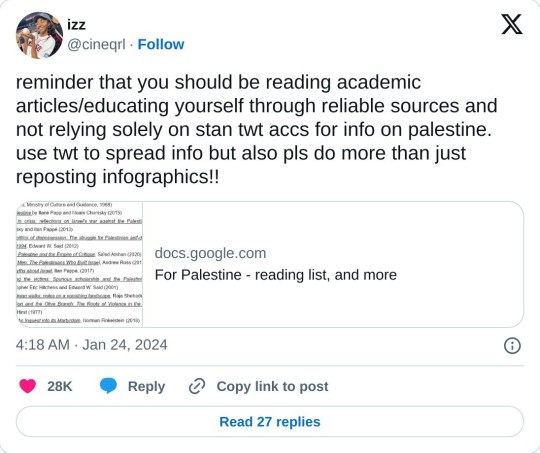
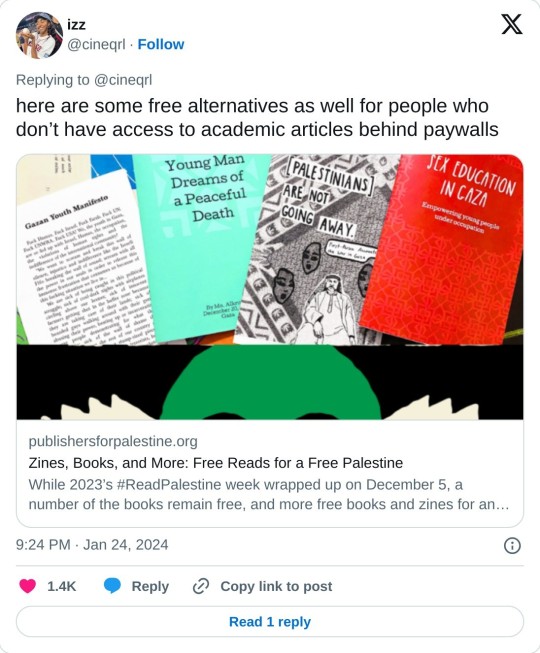
A copy of the first reading list, if you dislike clicking on Google docs links:
The liberal news media is working overtime to silence Palestinian voices. As we sit thousands of miles away, witnessing the massacre through social media, the least we can do is educate ourselves and work to educate others. Apartheid threatens all of us, and just to reiterate, anti-Zionism ≠ antisemitism.
Academic Works, Poetry and Memoirs
The Revolution of 1936-1939 in Palestine: Background, Details, and Analysis, Ghassan Kanafani (1972)
Palestinians: From Peasants to Revolutionaries, Rosemary Sayegh (1979)
Popular Resistance in Palestine: A History of Hope and Empowerment, Mazin Qumsiyeh (2011)
My Life in the PLO: The Inside Story of the Palestinian Struggle, Shafiq al-Hout and Jean Said Makdisi (2019)
My People Shall Live, Leila Khaled (1971)
Poetry of Resistance in Occupied Palestine, translated by Sulafa Hijjawi (Baghdad, Ministry of Culture and Guidance, 1968)
On Palestine by Ilan Pappé and Noam Chomsky (2015)
Gaza in Crisis: Reflections on the US-Israeli War Against the Palestinians, Noam Chomsky and Ilan Pappé (2013)
The Politics of Dispossession: The Struggle for Palestinian Self-Determination, 1969-1994, Edward W. Said (2012)
Queer Palestine and the Empire of Critique, Sa’ed Atshan (2020)
Stone Men: The Palestinians Who Built Israel, Andrew Ross (2019)
Ten Myths About Israel, Ilan Pappé (2017)
Blaming the Victims: Spurious Scholarship and the Palestinian Question, Christopher Eric Hitchens and Edward W. Said (2001)
Palestinian Walks: Notes on a Vanishing Landscape, Raja Shehadeh (2010)
The Gun and the Olive Branch: The Roots of Violence in the Middle East, David Hirst (1977)
Gaza: An Inquest into Its Martyrdom, Norman Finkelstein (2018)
Fateful Triangle: The United States, Israel and the Palestinians, Noam Chomsky (1983)
Israel and Palestine: Reappraisals, Revisions, Refutations, Avi Shlaim (2010)
Politicide: Ariel Sharon’s War Against the Palestinians, Baruch Kimmerling (2006)
The Holocaust Industry: Reflections on the Exploitation of Jewish Suffering, Norman G. Finkelstein (2015)
Light in Gaza: Writings Born of Fire, Jehad Abusalim (2022)
Nakba: Palestine, 1948, and the Claims of Memory, Ahmad H. Sa’di and Lila Abu-Lughod (2007)
Peace and its discontents: Essays on Palestine in the Middle East peace process, Edward W. Said (2012)
Three Poems by Yahya Hassan
Articles, Papers & Essays
“Palestinian history doesn’t start with the Nakba” by PYM (May, 2023)
“What the Uprising Means,” Salim Tamari (1988)
“The Palestinians’ inalienable right to resist,” Louis Allday (2021)
“Liberating a Palestinian Novel from Israeli Prison,” Danya Al-Saleh and Samar Al-Saleh (2023)
Women, War, and Peace: Reflections from the Intifada, Nahla Abdo (2002)
“A Place Without a Door” and “Uncle Give me a Cigarette”—Two Essays by Palestinian Political Prisoner, Walid Daqqah (2023)
“Live Like a Porcupine, Fight Like a Flea,” A Translation of an Article by Basel Al-Araj
Films & Video Essays
Fedayin: Georges Abdallah’s Fight (2021)
Naila and the Uprising (2017)
Off Frame AKA Revolution Until Victory (2015)
Tell Your Tale Little Bird (1993)
The Time That Remains (2009)
“The Present” (short film) (2020)
“How Palestinians were expelled from their homes”
Louis Theroux: The Ultra Zionists (2011)
Born in Gaza (2014)
5 Broken Cameras (2011)
Little Palestine: Diary of a Siege (2021)
Al-Nakba: The Palestinian catastrophe - Episode 1 | Featured Documentary
Organisations to donate to
Palestine Red Crescent Society - https://www.palestinercs.org/en
Anera - https://support.anera.org/a/palestine-emergency
Palestinian American Medical Association - https://palestinian-ama.networkforgood.com/projects/206145-gaza-medical-supplies-oct-2023
You First Gaza - https://donate.gazayoufirst.org/
MAP - Medical Aid for Palestinians - https://www.map.org.uk/donate/donate
United Nations Relief and Works Agency - https://donate.unrwa.org/-landing-page/en_EN
Palestine Children’s Relief Fund - https://www.pcrf.net/
Doctors Without Borders - https://www.doctorswithoutborders.org/what-we-do/where-we-work/palestine
AP Fact Check
https://apnews.com/article/israel-hamas-gaza-misinformation-fact-check-e58f9ab8696309305c3ea2bfb269258e
This list is not exhaustive in any way, and is a summary of various sources on the Internet. Please engage with more ethical, unbiased sources, including Decolonize Palestine and this list compiled by the Palestinian Youth Movement.
388 notes
·
View notes
Text
🐺 Subtle Fenrir Worship 🐾
Practice patience and compassion towards yourself
Spend time with any pets you have, especially dogs; play with them, walk them, give them a bath, etc.
Leave a dog treat or bone on your windowsill overnight for Fenrir (please keep your window closed if predators are in your area!!!)
Feed neighborhood dogs, cats, birds, etc.
Have a candle that reminds you of him (no altar needed)
Wear jewelry that reminds you of him
Keep a picture of him in your wallet
Volunteer at an animal or homeless shelter
Engage in random acts of kindness; hold the door for someone, buy someone in need a warm meal, offer to help someone carry stuff, etc.
Support animal/homeless shelters, environmental preservation organizations, or any cause you're passionate about
Have a stuffed animal wolf or snake (snake for his brother c:)
Have imagery of wolves, breaking chains, swords (broken swords especially), or the sun/moon, especially being chased by wolves (Sköll & Hati are said to be his children)
Fall asleep/meditate to the howling of wolves or sounds of the forest
Eat meat that you enjoy; get some good protein in your diet in general
Take a walk/hike in the woods or nature
Learn about healthy coping skills for stress, anxiety, depression, etc.
Make your space comfortable; make it your own!
Tie your hands together with string, and cut or break it as a symbolic breaking of chains
Sing a song, play an instrument, or listen to music in the evening or night (like a wolf howling its song)
Write poetry/stories about wolves, nature, chains, loneliness, friendship, or other themes within Fenrir's myth
Light fire or bonfire at night; sit in front of the fire and simply be at rest for awhile
Go camping; sleep under the stars out in nature
Drink something relaxing that you enjoy or mead; raise a glass to Fenrir
Learn a new survival skill; something that would be useful out in the wild
Allow yourself to feel your feelings; cry, shake, scream - whatever you need to do
Find a healthy outlet for your emotions; drawing, boxing, crafting, writing, etc.
Learn about self-defense; learn how to protect yourself (including weapon use if needed)
Try using your pet as a grounding presence; pet them, focus on their soft fur or smooth scales or fluffy feathers, notice how they feel calm and safe and let that tell you that you can be calm and safe as well, etc.
Ground yourself within nature; try to meditate there if you can
Stand up for yourself; practice being vocal about your discomfort or upset
Assert your boundaries; learn what your boundaries are; know that not all of them need to be spoken - they can be silent
Find healthy outlets for your emotions; boxing, dancing, drawing, writing, singing, etc.
Practice healthy conflict resolution skills; learn what healthy conflict resolution looks like
Spend time with your loved ones
Do something nice for your loved ones; cook them a meal, give them a gift, watch their favorite movie together, etc.
Cook a good meal for someone in need, especially one that's really filling
Engage in activities you're passionate about
Learn about your local flora and fauna
Go foraging (SAFELY!!!! RESEARCH FIRST!!!!)
Make a list of goals that you'd like to achieve - long-term and short-term; celebrate any progress you make towards these goals
Celebrate your accomplishments, big and small (making your bed, getting out of bed, eating breakfast, taking a shower, etc.)
-
For the time being, this is my list of discreet ways to worship Fenrir! I hope you found it useful. I'll likely add more to it later on. Take care, y'all!
Link to Subtle Worship Master list
#norse paganism#norse pagan#norse deities#paganblr#deity worship#norse heathen#pagan tips#fenrir#fenrir deity#fenrir worship
207 notes
·
View notes
Text
The Mid-Autumn Festival (中秋节), also known as the Mooncake Festival, falls on the 15th day of the eighth lunar month. It is called the Mid-autumn Festival because the 15th day is the middle of a month, and the eighth lunar month is in the middle of autumn. In Singapore, mooncakes and lanterns are offered for sale as early as a month before the festival. These days, however, it has become more common to give mooncakes as gifts than to eat them during the festival. The custom of offering sacrifices to the moon has been replaced by celebrating the festival with family and friends. Moon-viewing parties is one way to enjoy the occasion, with family and friends sitting in gardens lit by paper lanterns, sipping tea, nibbling on mooncakes, and if so inspired, composing poetry in venerable Tang Dynasty fashion.

The Full Moon is considered a symbol of reunion, as such the Mid-autumn Festival is also known as the Reunion Festival. Shaped round like the full moon, mooncakes signify reunion. The Mid-autumn Festival is associated with the moon and “moon appreciation” (赏月) parties, particularly because the moon is at its brightest during this time. The festival also coincides with the end of the autumn harvest, marking the end of the Hungry Ghost Festival, which occurs during the seventh lunar month. The day of the Mid-autumn Festival is traditionally thought to be auspicious for weddings, as the moon goddess is believed to extend conjugal bliss to couples.
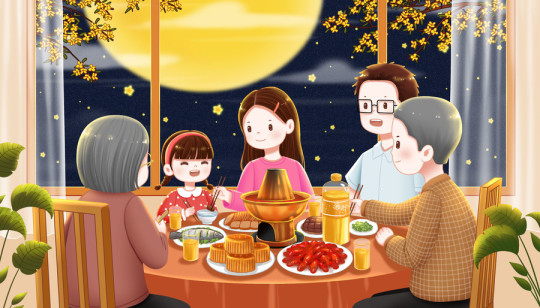
Among the Chinese, the most popular of all the tales connected with the Mid-autumn Festival is that of Chang-E (嫦娥), also known as the Moon Lady, and her husband Hou Yi (后羿). This myth is said to have originated from storytellers in the Tang dynasty (618–907 CE), and even as far back as the time of Emperor Yao (2346 BCE).
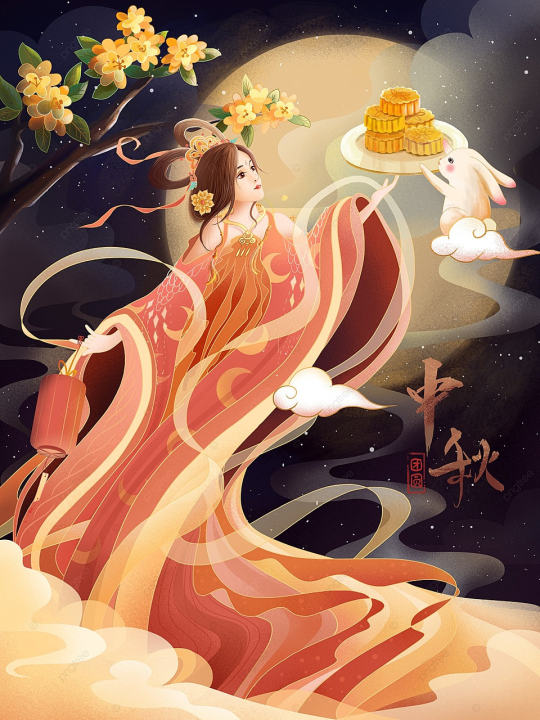
youtube
Hidden Messages in Mooncakes played a major role in the liberation of Yuan China (1206–1341 CE) from the Mongols in the 14th century. Despite a prohibition against large gatherings, rebel leader Zhu Yuan Zhang was able to instigate a rebellion by placing secret messages in mooncakes. The rebellion took place during the Mid-autumn Festival, and the celebration of the festival and eating of mooncakes took on a different meaning thereafter.

Information from National Library Board. Bo Jio literally meaning “not invited” in Hokkien.
#Mid-Autumn Festival#中秋节#Mooncake Festival#农历八月十五#Chinese Culture#Chinese Tradition#Celebration#Season Greeting#Mooncake#月饼#Moon Appreciation#赏月#Chang-E#嫦娥#Hou Yi#后羿#Hidden Messages#Video#Youtube#Snack#Dessert#Asian Food#Food#Buffetlicious
99 notes
·
View notes
Text
What Non-Pagans Need to Know About Fiction Featuring Pagan Gods
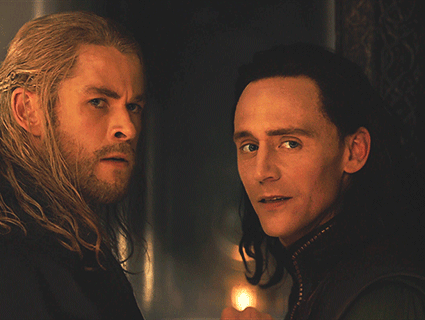
In light of Marvel's Loki show dropping a second season and a new Percy Jackson series on the horizon, I want to say some things about how fandom spaces can be respectful of real-life pagan religion.
Let's get one thing out of the way: literally no one is saying you can't enjoy fiction that uses pagan gods and heroes as characters. No one is saying, "Stop writing stories about our gods." In fact, many ancient cultures wrote fiction about their gods -- look at Greek theater or the Norse Eddas. The act of writing fiction about the gods is not offensive in itself.
But please remember that this is someone's religion.
The gods are not "just archetypes." Their myths are not "just stories." Their personalities are not a matter of artistic interpretation. For many pagans, the gods are very much real in a literal sense. I don't think Thor is a metaphor or a symbol -- for me, Thor is a real, autonomous spiritual being who exists outside of human perceptions of him, and who I have chosen to build a relationship with. Even if you are a hardcore atheist, I would hope you could at least be respectful of the fact that, to many modern pagans, the gods are both very real and very important.
When authors are not respectful of this fact, they reduce the gods, these very real objects of worship, to fictional characters. And here's the thing about fictional characters: they are fundamentally tools for authors to use to draw a desired emotional response from an audience.
Dracula's personality and behavior is wildly different depending on who is writing him, because different authors use Dracula to create different reactions in their audiences. In the 1931 film starring Bela Lugosi, he's equal parts alluring and disturbing, a symbol of America's mixed desire and disdain for foreigners. In Nosferatu, he's more strictly frightening and disgusting. In Francis Ford Coppola's movie, he's a tragic, romantic figure clinging to the last scraps of his humanity. In Netflix's Castlevania, he's an incredibly powerful being who has grown bitter and apathetic in his immortality. All of this is Dracula, and all of it is fine, because Dracula is not and never has been a central figure in anyone's religion.
Let's take a look at what happens when authors give this same treatment to real gods:
In Hellenic polytheism, Apollo is one of the most beloved gods, both historically and today. Apollo loves humanity, and humanity loves him back. He is the god of sunlight and of medicine, but also of poetry and song. He is one of humanity's most consistent defenders when one of the other gods gets wrathful. And while he does have dangerous or wrathful aspects of his own (he's also the god of disease, after all), he's also kind and soft with humanity in a way other gods often aren't, at least in some historic sources.
In the Lore Olympus comic series, Apollo is a villain. He's characterized as an abuser, a manipulator, and a violent man child. LO!Apollo is downright hateful, because the author wants us to hate him. Lore Olympus is a retelling of a myth about an abduction and forced marriage. Lore Olympus is also a romance. In order to get the audience to sympathize with Hades and root for his relationship with Persephone, Rachel Smythe needed to make someone else the villain. Apollo is the most obvious and extreme character assassination in Smythe's work, but several other gods (notably Demeter) also get the asshole makeover to tell the story Smythe wants to tell.
Here's where this becomes a problem: Hellenic polytheism is a fairly small religious community, while Lore Olympus is a massively popular webtoon with 1.3 billion views as of August 2023, print books available from major retailers, a TV adaptation in the works, and a very active online fandom. Rachel Smythe currently has a MUCH bigger platform than any Hellenic polytheism practitioner. Smythe and other authors are shaping how modern culture views the Hellenic gods, and that has a very real impact on their worshipers.
This means "Apollo is an abusive asshole" is becoming a popular take online, and is even creeping into pagan communities. I've personally seen people be harassed for worshiping Apollo because of it. I've seen new pagans and pagan-curious folks who totally misunderstand the roles Apollo, Hades, and Persephone play in the Hellenic pantheon because of Lore Olympus and other modern works of fiction.
There are tons of other examples of this in modern pop culture, but I'll just rattle off a few of the ones that annoy me most: Rick Riordan depicting Ares/Mars as a brutish asshole hyped up on toxic masculinity; Rick Riordan depicting Athena as a mother goddess; Marvel depicting Thor as a dumb jock; Marvel depicting Odin as a cold, uncaring father; DC depicting Ares as purely evil; whatever the fuck the Vikings TV show was trying to do with seidr; the list goes on.
All of these are examples of religious appropriation. Religious appropriation is when sacred symbols are taken out of their original religious context by outsiders, so that the original meaning is lost or changed. It requires a power imbalance -- the person taking the symbols is usually part of a dominant religious culture. In many cases, the person doing the appropriation has a much bigger platform than anyone who has the knowledge to correct them.
When Rick Rioridan or Rachel Smythe totally mischaracterizes a Greek god to tell a story, and then actual Hellenic pagans get harassed for worshiping that god, that's religious appropriation.
Religious appropriation is a real issue. This isn't just pagans being sensitive. To use an extreme example: Richard Wagner and other German Romantic authors in the 19th century used the Norse gods and other Germanic deities as symbols in their work, which was a major influence on Nazi philosophy. Without Wagner, the Nazis would not have latched onto the Norse gods as symbols of their white supremacist agenda. To this day, there are white supremacist groups who claim to worship our gods or who use our religious imagery in their hate movement. We are still reckoning with the misinterpretation of our gods popularized by Wagner and other German Romantics almost 200 years ago.
Again, no one is saying you can't enjoy fiction based on pagan mythology. But there are a few things you can do to help prevent religious appropriation in fandom spaces:
Above all else, be mindful that while this may just be a story to you, it is someone's religion.
Recognize that enjoying fiction based on our gods does not mean you know our gods. You know fictional characters with the same names as our gods, who may or may not be accurate to real-life worship.
Do not argue with or try to correct pagans when we talk about our experience of our gods.
Don't invalidate or belittle pagan worship. Again, this mostly comes down to recognizing that our religion is totally separate from your fandom. We aren't LARPing or playing pretend. Our sacred traditions are real and valid.
If you see other people in your fandom engaging in religious appropriation, point out what they are doing and why it isn't okay.
Please tag your fandom content appropriately on social media. Always tag the show, movie, book, etc. that a post is about in addition to other relevant tags. This allows pagans to block these fandom tags if we don't want to see them and prevents fandom content showing up in religious tags.
For example, if I'm posting about Athena from the Percy Jackson books, I would tag the post #athena #athenapjo #percyjackson #pjo. You get the idea.
And if fiction sparks your interest and you want to learn more about the actual worship of the gods, you can always ask! Most pagans love talking about our gods and trading book recs.
If you are writing fiction based on real mythology, talk to people who worship those gods. Ask them what a respectful portrayal would look like. If possible, include a note in your finished work reminding audiences that it is a work of fiction and not meant to accurately portray these gods.
#btw hades is also not a villain in helpol#this post is just mostly discussing how lo villiainizes apollo#shoutout to my roman pagan husband for proofreading and offering feedback#this post is Approved By The Council#psa#long post#paganism#pagan#paganblr#heathenry#norse heathen#norse paganism#inclusive heathenry#hellenic polytheism#helpol#religio romana#roman polytheism#roman pagan#marvel#mcu#loki series#loki season 2#percy jackson#percy jackson and the olympians#pjo#lore olympus#religious appropriation#my writing#white supremacy mention#white supremacy tw
409 notes
·
View notes
Text

Night Migration 20 x 30 inches, Oil A new painting from an earlier study coming to the IX Art Show next week in Reading, PA!
In our night sky there is a dark band that runs through the Milky Way, known as the Great Rift. This darkness is where the stars of our galaxy are obscured by vast clouds of interstellar dust and geese … er, gas.
There is an experience of magic to be found in the poetry of stories, new and old. For many thousands of years, our ancestors looked at the random distribution of stars in the night sky and saw things that were familiar to them. Some people think that living with a scientific worldview means giving up the wonder of our ancestor’s stories. Yet, just as enjoying a fantasy novel doesn’t require believing it to be true, having a grounded, science-based worldview doesn’t have to keep you from enjoying the beauty and poetry of myth and metaphor.
Just don’t make any important life decisions as though there are really giant geese in space, okay?
Prints: https://robrey.storenvy.com
106 notes
·
View notes